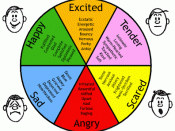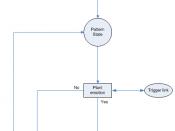In psychology, there are various theories about emotions. In everyday experience ÃÂemotions involve a triggering event that causes overlapping effects of psychological reactions, feelings and decisions.ÃÂ1 ÃÂRobert Plutchik proposed that there are only eight basic emotions, and they are acceptance, anger, anticipation, disgust, joy, fear sadness and surprise.ÃÂ All the other emotions are supposed to be combinations of these and each emotion can be shown in varying intensity levels.
Researchers have found that terms such as vision and memory are generally accepted when applied to robots but many researchers remain sceptical about the use of the term emotion being applied to robots and the possibility for robots to have emotions and emotional interactions with humans. Arguments are usually based on the fact that it is impossible for robots to implement notions such as self, feelings, experience and consciousness. So now comes the question, are robots able to have these emotions and are they able to implement them in the same way humans do?Robots are not biological systems; they are made from a totally different material and have different bodies.
This is the key component that every individual who opposes robots having emotion, use in their argument. It is emotions which distinguish us from creations of metal. But for arguments sake both arguments should be taken into consideration.
Advocates define emotion as ÃÂa complex collection of chemical and neuronal responses forming patterns.ÃÂ These opposing definitions lead us to think emotions can be something else for different individuals. The main problem is that all emotions generate feelings but only some feelings generate emotions. I believe that feelings and emotions both provide a crucial role that has to be accounted for when implemented in robots.
This role is survivability. Emotions serve as one of the mechanisms that complete us as human and help natural systems cope with the world. Often when we are hit by a critical situation, time does not always allow us to make the most suitable action this is because emotions modulate our behavioural response and play a big role in the decisions we make.
After knowing all these limitations and risk of robots having or being able to showing emotions, is there any alternatives? Well a robot must be able to think and reason on its own, plan and imagine alterative courses of action and evaluate the goodness and badness of the results. Now obviously as discussed above this is close to impossible since decisions are affected by components such as emotion. I believe if there was any chance of creating a robot at the AI level it would have to be programmed to learn through experience and its surrounding environment, just like us humans do. Only this way will a robot be able to relate to humans in a practical and precise manner. Humans learn over time through pleasure and pain, rewards and punishment that are caused by the event itself or an individual. Similarly, a robot can be programmed in this manner where its surroundings are humans and it learns to adapt or at least relate to the human lifestyle.
In conclusion, I donÃÂt believe robots will ever be able to have or show emotions at a level so high as humans do because emotions are more than just the electro-chemical activity that takes place in our brains. However, robots could come close to our level of emotion through some of the ideas discussed above but if so it can be risky and dangerous and could backlash, turning into just like how we see it in fiction films where robots become evil and try defeating the human race.
Bibliography1.Can robots have emotions? Dylan Evans (2001),http://www.dylan.org.uk/robotemotion.pdf,Access Date: 26/10/092.The Nature of Emotions,http://www.fractal.org/Bewustzijns-Besturings-Model/Nature-of-emotions.htm,Access Date: 26/10/093.Thoughts Decoded ÃÂ Robots and Emotion (2007)http://www.thoughtsdecoded.com/2007/10/can-robot-have-emotions/,Access Date: 26/10/094.Essa, I. and A. Pentland (1997). ÃÂCoding, analysis, interpretation and recognition offacial expressions.ÃÂ IEEE Transactions on Pattern Analysis and Machine IntelligencePages: 757-763.
Access Date: 27/10/095.Evans, D. (2001) Emotion: The Science of Sentiment. Oxford University Press.
Access Date: 27/10/096.Grand, S. (2004) Growing up with Lucy: How to build an android in twenty easysteps. Weidenfeld & Nicholson.
Access Date: 27/10/09





